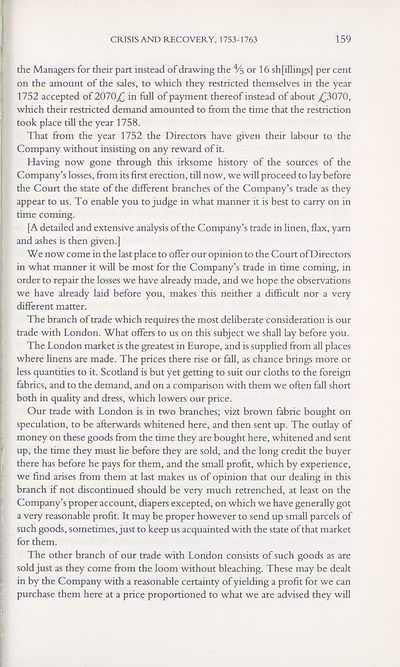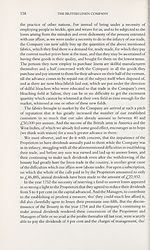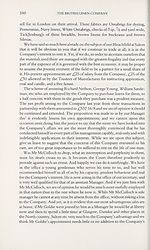Series 5 > British Linen Company, 1745-1775
(176) Page 159
Download files
Complete book:
Individual page:
Thumbnail gallery: Grid view | List view

CRISIS AND RECOVERY, 1753-1763
159
the Managers for their part instead of drawing the V5 or 16 sh[illings] per cent
on the amount of the sales, to which they restricted themselves in the year
1752 accepted of 2070^ in full of payment thereof instead of about £3070,
which their restricted demand amounted to from the time that the restriction
took place till the year 1758.
That from the year 1752 the Directors have given their labour to the
Company without insisting on any reward of it.
Having now gone through this irksome history of the sources of the
Company’s losses, from its first erection, till now, we will proceed to lay before
the Court the state of the different branches of the Company’s trade as they
appear to us. To enable you to judge in what manner it is best to carry on in
time coming.
[A detailed and extensive analysis of the Company’s trade in linen, flax, yam
and ashes is then given.]
We now come in the last place to offer our opinion to the Court ofDirectors
in what manner it will be most for the Company’s trade in time coming, in
order to repair the losses we have already made, and we hope the observations
we have already laid before you, makes this neither a difficult nor a very
different matter.
The branch of trade which requires the most deliberate consideration is our
trade with London. What offers to us on this subject we shall lay before you.
The London market is the greatest in Europe, and is supplied from all places
where linens are made. The prices there rise or fall, as chance brings more or
less quantities to it. Scotland is but yet getting to suit our cloths to the foreign
fabrics, and to the demand, and on a comparison with them we often fall short
both in quality and dress, which lowers our price.
Our trade with London is in two branches; vizt brown fabric bought on
speculation, to be afterwards whitened here, and then sent up. The outlay of
money on these goods from the time they are bought here, whitened and sent
up, the time they must lie before they are sold, and the long credit the buyer
there has before he pays for them, and the small profit, which by experience,
we find arises from them at last makes us of opinion that our dealing in this
branch if not discontinued should be very much retrenched, at least on the
Company’s proper account, diapers excepted, on which we have generally got
a very reasonable profit. It may be proper however to send up small parcels of
such goods, sometimes, just to keep us acquainted with the state of that market
for them.
The other branch of our trade with London consists of such goods as are
sold just as they come from the loom without bleaching. These may be dealt
in by the Company with a reasonable certainty of yielding a profit for we can
purchase them here at a price proportioned to what we are advised they will
159
the Managers for their part instead of drawing the V5 or 16 sh[illings] per cent
on the amount of the sales, to which they restricted themselves in the year
1752 accepted of 2070^ in full of payment thereof instead of about £3070,
which their restricted demand amounted to from the time that the restriction
took place till the year 1758.
That from the year 1752 the Directors have given their labour to the
Company without insisting on any reward of it.
Having now gone through this irksome history of the sources of the
Company’s losses, from its first erection, till now, we will proceed to lay before
the Court the state of the different branches of the Company’s trade as they
appear to us. To enable you to judge in what manner it is best to carry on in
time coming.
[A detailed and extensive analysis of the Company’s trade in linen, flax, yam
and ashes is then given.]
We now come in the last place to offer our opinion to the Court ofDirectors
in what manner it will be most for the Company’s trade in time coming, in
order to repair the losses we have already made, and we hope the observations
we have already laid before you, makes this neither a difficult nor a very
different matter.
The branch of trade which requires the most deliberate consideration is our
trade with London. What offers to us on this subject we shall lay before you.
The London market is the greatest in Europe, and is supplied from all places
where linens are made. The prices there rise or fall, as chance brings more or
less quantities to it. Scotland is but yet getting to suit our cloths to the foreign
fabrics, and to the demand, and on a comparison with them we often fall short
both in quality and dress, which lowers our price.
Our trade with London is in two branches; vizt brown fabric bought on
speculation, to be afterwards whitened here, and then sent up. The outlay of
money on these goods from the time they are bought here, whitened and sent
up, the time they must lie before they are sold, and the long credit the buyer
there has before he pays for them, and the small profit, which by experience,
we find arises from them at last makes us of opinion that our dealing in this
branch if not discontinued should be very much retrenched, at least on the
Company’s proper account, diapers excepted, on which we have generally got
a very reasonable profit. It may be proper however to send up small parcels of
such goods, sometimes, just to keep us acquainted with the state of that market
for them.
The other branch of our trade with London consists of such goods as are
sold just as they come from the loom without bleaching. These may be dealt
in by the Company with a reasonable certainty of yielding a profit for we can
purchase them here at a price proportioned to what we are advised they will
Set display mode to:
![]() Universal Viewer |
Universal Viewer | ![]() Mirador |
Large image | Transcription
Mirador |
Large image | Transcription
Images and transcriptions on this page, including medium image downloads, may be used under the Creative Commons Attribution 4.0 International Licence unless otherwise stated. ![]()
| Scottish History Society volumes > Series 5 > British Linen Company, 1745-1775 > (176) Page 159 |
|---|
| Permanent URL | https://digital.nls.uk/127333161 |
|---|
| Description | Over 180 volumes, published by the Scottish History Society, containing original sources on Scotland's history and people. With a wide range of subjects, the books collectively cover all periods from the 12th to 20th centuries, and reflect changing trends in Scottish history. Sources are accompanied by scholarly interpretation, references and bibliographies. Volumes are usually published annually, and more digitised volumes will be added as they become available. |
|---|


